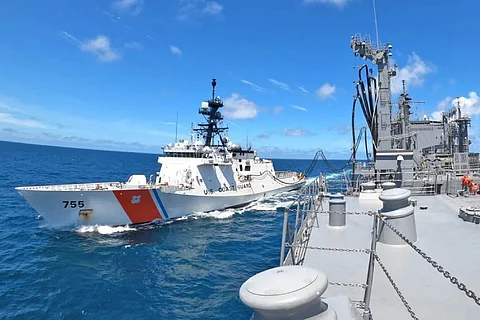

America's allies in the Indo-Pacific are getting pretty familiar with China's grey-zone maritime behaviour, but the United States itself is ill-prepared for dealing with it. Yet it should be prepared, experts warned a US House of Representatives committee in a hearing this month. The US must not only counter the threat to its national security posed by China's coercive operations, but also support its allies against Chinese efforts to rewrite the rule of law in the region.
The US Coast Guard, America's best tool for responding to China's use of force below the threshold of war, was underequipped for the task, maritime security experts from the US Naval War College, the Heritage Foundation and the RAND Corporation told the committee. The service needed more ships, more sailors, and advanced capabilities tailored to countering grey-zone operations at sea, they said. It must also increase its engagement with Indo-Pacific allies to build up maritime law enforcement cooperation in the region.
The coast guard's chronic shortage of personnel and vessels could no longer be ignored, experts said. Their warnings were consistent with broader concerns in the national defence community that, at a time of heightened need for law enforcement operations in the Indo-Pacific, the coast guard is spread too thinly. This past year, staff shortages have forced it to shut down 29 boat stations and deactivate several cutters. Experts also testified that the service's acquisition plans were inadequate for replacing old vessels and commissioning long-range cutters needed for patrolling the Indo-Pacific region.
In its gutted state, the US Coast Guard is underprepared to carry out law enforcement duties in the Pacific Ocean and compete with China's heavily militarised coast guard—a key perpetrator of illegal grey-zone operations. More ships and more sailors are only part of the solution. The coast guard must also explore advanced technologies that enhance its ability to deter Chinese operations, the committee was told at the June 4 hearing.
One suggestion from former US Navy captain Brent Sadler, a senior researcher at the Heritage Foundation, was to deploy a non-lethal directed-energy device, the Active Denial System (ADS), on coast guard cutters. Electromagnetic energy from the system induces a painful sensation on the skin of the targeted person but without causing injury. Feeling pain, the target will then move out of the beam's path.
Currently employed by the US Marine Corps, the ADS could disperse illegal fishing fleets or counter Chinese commanders' technique of colliding their ships with foreign vessels sideways, Sadler said. The non-lethal nature of the laser could coerce an adversary without escalating to an act of war.
Sadler also urged that the coast guard should lift its anti-cyber warfare capabilities. In May, a China-linked hacking group attacked several European cargo ships, demonstrating a dangerous cyber threat to maritime commerce.
Boosting cybersecurity capabilities is essential. American ports lack sufficient cybersecurity infrastructure despite facing increasing cyber threats from Chinese hacking organisations, as the US Coast Guard itself acknowledged in an April report. Any incident that affects port operations could have international economic consequences. Given the heightened cyber threat environment, the US Coast Guard must increase its capacity to investigate cyber interference in maritime incidents and protect American vessels and ports from cyber attacks.
In addition, the coast guard must ramp up surveillance capabilities to extend its capacity to patrol the Indo-Pacific, the committee heard. Specifically, experts urged deployment of Expeditionary Transfer Dock (ESD) ships that could serve as floating bases for drones, smaller craft, and fixed-wing aircraft conducting law enforcement-related surveillance and reconnaissance. Using ESDs would extend the range of the coast guard's eyes and ears in the Pacific Ocean, amplifying its capacity to identify and indict criminal actors.
Finally, Eric Cooper, a former US Coast Guard officer and present senior policy researcher at the RAND Corporation, advised that the coast guard should lean harder into international maritime law enforcement partnerships. The US already has shiprider agreements with 11 Pacific Island nations and a history of joint maritime law enforcement exercises with regional allies. The coast guard must strengthen these relationships, which provide a valuable platform for cooperative operations, training, and information sharing, Cooper said. This is essential to deterring China's grey-zone maritime behaviour and preventing the outbreak of kinetic conflict.
Overall, the hearing demonstrated that maritime security experts endorse the US Coast Guard's role in countering China's grey-zone activities in the Pacific Ocean. A well-equipped, technologically advanced coast guard that participates rigorously in international maritime law enforcement cooperation is essential to America's broader deterrence strategy against China's maritime aggression and to maintaining the rule of law in the Indo-Pacific.
